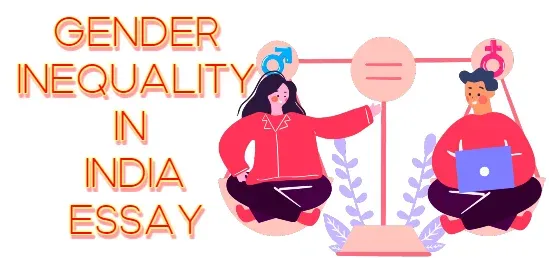Essay On Gender Inequality in English For Students
Gender Inequality in India Essay
Gender is a socio-cultural term referring to socially defined roles to males and females. The concept of treating men and women equally is termed gender equality. Gender equality is a burning social issue today.
Patriarchy became the order of society. In the patriarchal system, the patriarch or male was considered the head of the household and had the natural authority to make family decisions.
It has been the root of discrimination between genders. Women have always been dominated by men in a patriarchal society where men are the rule-makers. Men are the supreme authority and women are the followers.
People are taught male patriarchy through education, male dominance is enforced and a masculine view of the world is presented to children. Women are considered to be physically weaker than men.
At a very early age, girls are expected to help out in household duties which are highly unpaid and unrecognized and they are expected to do that throughout their lives.
The unequal distribution of opportunities and resources continues into adulthood and also women face significant wage gaps and indiscriminate sexism in everyday affairs.
Similarly, boys who grow up seeing their mothers unquestionably handle all the housework, expect their wives and daughters to follow the same.
Gender roles were biased by custom, tradition, and sexist culture that downgraded women on the basis of their biological weakness.
Women are often looked down upon by society or entitled to areas less significant or dedicated by men. Nature does not discriminate against men from women.
But women worldwide have been the victim of inequality not only in terms of social and political rights but also on grounds of employment opportunities.
Without effective gender equality, getting rid of social evils like female feticide and the discrepancy in education between men and women is not possible.
Gender equality issues in India
• Women have been subjected to household or domestic expression for ages. They are dominated by males psychologically which creates a lack of self-confidence in them to face society.
• Women are not well aware of their rights and legal provisions that favor and protect them.
• Women have fewer opportunities and less access to basic and higher education, greater health and safety risks, and less political representation.
• Families with limited means cannot afford the cost of education and don't allow the girl children to study.
• Female feticide and female infanticide is a common scenarios where sex-selective operations are done to kill the girl's child even before she is born.
• The average sex ratio in India has declined from 906 female births per 1,000 male births in 2012-14 to 898 in 2014-16.
• Crimes against women show an upward trend, in particular brutal crimes such as rapes, dowry deaths, and honor killings.
• The dowry system, involving cash or in-kind payment from the bride's family to the groom's at the time of marriage, is another institution that disempowers women.
• Patriarchy is so deeply entrenched both in our mindset and our laws, Indians have long since accepted the current social situation as the default one.
Gender equality is required for equal participation of females in all the sectors including agriculture, manufacturing industries, etc., and more awareness among men to share household and domestic responsibilities, a better access for women to resources like land, property, and education. Such resources strengthen the chances that future generations would suffer from fewer instances of gender discrimination.
The constitution of India grants equality to women and also empowers the state to adopt measures of positive discrimination in favor of women for neutralizing the cumulative education, and political and socio-economic disadvantages faced by them.
The state has enacted various legislative measures intended to ensure equal rights to encounter social discrimination and atrocities. Some of the acts are molestation (sec .354 IPC), torture both mental and physical (sec. 498-A IPC), sexual harassment (sec. 509 IPC), etc.
Constitutional privileges provided are, article 15 that states not to discriminate against any citizen on the grounds of race, sex, caste, sex, place of birth, or any of them.
Article 39A, states to promote justice based on equal opportunity and to provide legal aid by suitable legislation or scheme or in any other way to ensure that opportunities for securing justice are not denied to any citizen because of economic or other disabilities.
There are many more laws and acts to protect the rights of women and to ensure gender equality. The government of India has launched many schemes to uplift women in society. "Beti Bachao Beti padhao" initiative for empowering women in the field of education was launched.
Another scheme called the one-stop center scheme meant to offer easy access for women suffering from domestic abuse or violence and who need support was introduced.
Gender inequality can only be removed when the mentality of men will change when the male species of human beings would start treating women as equal and not subordinate or weaker to them.
Also, women need to change their mindset as they are playing a supportive role in furthering men's agenda of dominating women.
The movement for women's empowerment is needed where women can become economically independent and self-reliant, where they can fight their own fears and get their rights and don't have to ask for them.
Women should have a good education, a good career, ownership of property, and most importantly freedom to make their own decisions.
Also read:- biography of swami Vivekananda
THANK YOU SO MUCH

India should start working more on the best ERP systems USA that could increase the efficiency of the output.
ReplyDelete